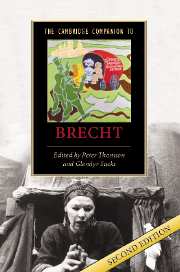2 - Brecht’s lives
from Part I - Context and Life
Published online by Cambridge University Press: 28 March 2007
Summary
'The more I learned about Brecht the less I liked him', wrote the American journalist Bruce Cook, after concluding his research for Brecht in Exile. The response is familiar. Assessments of Brecht the man continue to intervene in assessments of Brecht the writer, generally to the detriment of both. The destruction of reputation is big media business, and a stubbornly opinionated marxist is a tempting prospect for scandalmongers in the capitalist democracies. It may be argued that Brecht's subject-matter licenses such moral scrutiny. If you write about 'goodness' as often as he does, you are likely to have your own virtue questioned. Brecht's inclination was to measure bourgeois notions of morality against the exigencies of economic privation under capitalism. The inclination of some Western critics has been to measure Brecht's personal morality against the approved norms of the soi-disant democracies, and to launch attacks on his political integrity from the elevated vantage-point thus secured. My purpose, in this essay, is not to defend Brecht, but to indicate as fairly as I can the circumstances against and within which he wrote.
- Type
- Chapter
- Information
- The Cambridge Companion to Brecht , pp. 22 - 39Publisher: Cambridge University PressPrint publication year: 2006
- 1
- Cited by



